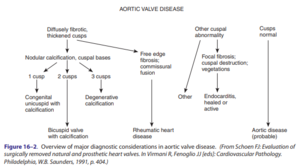Difference between revisions of "Grossing"
m |
m (→Cardiac Valves) |
||
| (8 intermediate revisions by the same user not shown) | |||
| Line 1: | Line 1: | ||
Lorum ipsum | Lorum ipsum | ||
{{Lesters| | ==Margins== | ||
Present on all resections to document the presence or absence of tumour and/or viability of the resection margin {{Lesters|margins}} | |||
===En face (shave, parallel) === | |||
=== En face (shave, parallel) === | |||
Advantages | Advantages | ||
* more surface area | *more surface area | ||
* entire structures can be evaluated (e.g., bronchus, ureter) | *entire structures can be evaluated (e.g., bronchus, ureter) | ||
Disadvantages | Disadvantages | ||
* cannot measure the exact distance | *cannot measure the exact distance | ||
* can be difficult to interpret when cautery artifact is present | *can be difficult to interpret when cautery artifact is present | ||
=== Perpendicular === | ===Perpendicular=== | ||
Advantages | Advantages | ||
* exact distance can be measured | *exact distance can be measured | ||
Disadvantages | Disadvantages | ||
* very little tissue is evaluated in larger resections | *very little tissue is evaluated in larger resections | ||
''Rule of thumb: if the margin is < 2 cm away in a resection, submit perpendicular. If not, consider the value in allowing the pathologist to evaluate the entire margin in a single cassette'' | |||
== Cardiac Valves == | |||
[[File:Aortic_valve_disease.PNG|alt=|thumb]] | |||
Degenerative Calcific Aortic Valve stenosis. Calcified at the base, usually not cuspal edges. Cusps may be heavily fibrosed and thickened but not fused. Congenital bicuspid valves are predisposed to degenerative calcification. Usually one of the cusps is larger with a midline raphe resulting from the incomplete separation of two cusps. The raphe is often the site of extensive calcification {{Lesters|1=page=310}} | |||
"Calcific aortic stenosis occurring on a congenitally bicuspid valve. One cusp has a partial fusion at its center, called a raphe" {{Robbins|1=page=403}} | |||
Latest revision as of 01:51, 10 January 2021
Lorum ipsum
Margins
Present on all resections to document the presence or absence of tumour and/or viability of the resection margin 📕
En face (shave, parallel)
Advantages
- more surface area
- entire structures can be evaluated (e.g., bronchus, ureter)
Disadvantages
- cannot measure the exact distance
- can be difficult to interpret when cautery artifact is present
Perpendicular
Advantages
- exact distance can be measured
Disadvantages
- very little tissue is evaluated in larger resections
Rule of thumb: if the margin is < 2 cm away in a resection, submit perpendicular. If not, consider the value in allowing the pathologist to evaluate the entire margin in a single cassette
Cardiac Valves
Degenerative Calcific Aortic Valve stenosis. Calcified at the base, usually not cuspal edges. Cusps may be heavily fibrosed and thickened but not fused. Congenital bicuspid valves are predisposed to degenerative calcification. Usually one of the cusps is larger with a midline raphe resulting from the incomplete separation of two cusps. The raphe is often the site of extensive calcification 📕
"Calcific aortic stenosis occurring on a congenitally bicuspid valve. One cusp has a partial fusion at its center, called a raphe" 📘
